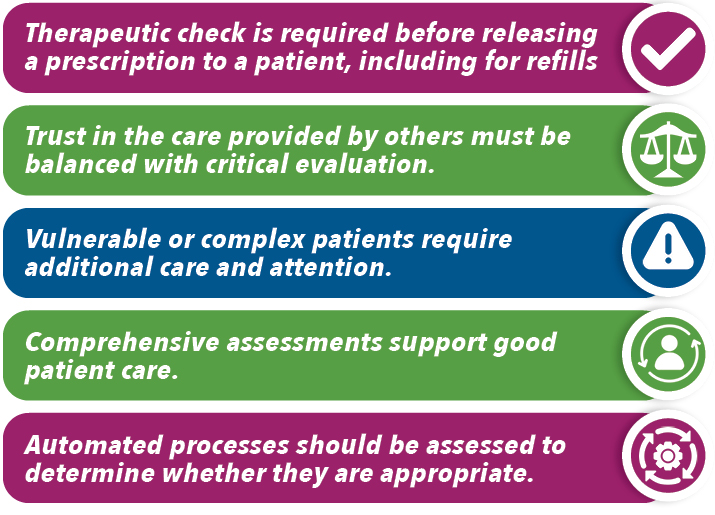Practice Insight explores concerns reported to the College that present learning opportunities for pharmacists and pharmacy technicians. This example reminds registrants that therapeutic checks must be done for every refill.
Note: While there were multiple registrants involved in the complaint below, this column will focus only on one registrant.
A Medication Error is Made Repeatedly
A complainant reported that their five-year-old child had been repeatedly provided with the wrong medication. The child was prescribed tacrolimus immediate release twice a day but was instead dispensed tacrolimus extended release twice a day. The error was not caught for several months, though it was refilled and dispensed incorrectly by different pharmacists over this course of time.
Lack of Thorough Clinical Assessment a Key Contributor
The pharmacist involved in one of the dispensing incidents indicated that they verified the refill request for the medication, noted that there were no changes to the prescription and product-checked the medication. The software at the pharmacy was set up to skip verification of the original prescription for refills, which meant that the image of the original prescription would not be provided unless the pharmacist chose to manually open it.
In reviewing the complaint, the panel of the Inquiries, Complaints and Reports Committee (ICRC) noted that while it was common for pharmacists to assume that the previous pharmacist performed correct clinical verifications, doing so can cause errors.
The panel noted that the pharmacist did not identify that the formulation was clinically inappropriate given the twice daily dosing and the patient’s age. A child is a red flag patient, and more care and attention were required.
The panel emphasized that the registrant should have performed a thorough clinical assessment, which is the expectation for all prescriptions, including refills.
The pharmacist was required to complete the Patient Assessment: An Integral Part of Pharmacy Practice course to assist them to better assess prescriptions and patients.
Learnings for Registrants

- A therapeutic check is required before releasing a prescription to a patient, including for refills. It is the pharmacist’s responsibility to determine the medication’s appropriateness for the patient before dispensing.
- Trust in the care provided by colleagues and other healthcare providers must be balanced with critical evaluation. Avoid making assumptions that there is no problem with the therapy because other pharmacists have previously dispensed the same prescription and the patient has not raised any concerns. All registrants should also be aware of the potential for confirmation bias, which is the tendency to see what you expect to see or are familiar with.
- Vulnerable or complex patients require additional care and attention. The Code of Ethics requires that pharmacy professionals must be diligent in identifying and responding to red flag situations, which could be in relation to a patient’s age, circumstances, or medical conditions.
- Comprehensive assessments support good patient care. Patient assessments contribute to optimized patient care and help reduce patient harm by identifying drug related problems. The Pharmacy Connection article The Importance of Patient Assessment provides tips on what to consider when assessing patients for refill prescriptions.
- Automated processes should be assessed to determine whether they are appropriate. Many software systems provide pre-set processes to enable the efficient processing of prescriptions. However, pharmacy teams should assess and determine whether there are modifications to be made to ensure patients are provided with the correct medications. Pharmacy practice management systems must be capable of displaying the content of a prescription as it was received by the pharmacy.













